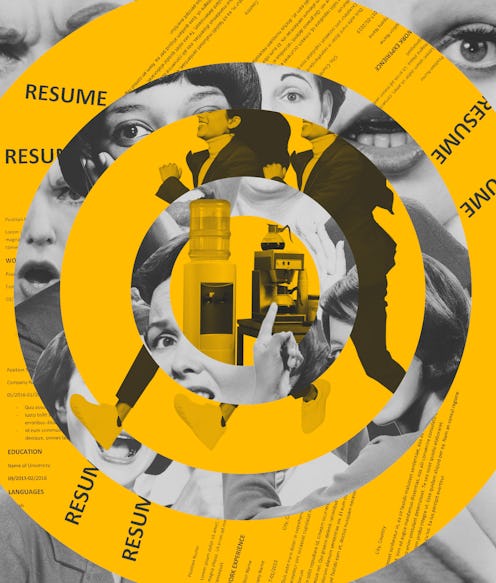Upon Further Inspection
13 Things To Keep In Mind When Hopping Jobs
Let’s hear it for the career pivot.
by Ginny Hogan

Pay raises for those switching jobs, aka job-hoppers, are at an all-time high. Thanks to our “new normal” and the “Great Resignation,” there’s more demand than ever for labor. Isn’t it nice to finally feel like you — who makes 1/700th what your CEO does — are the one in control? You might get as much as a 28% pay raise, which — adjusted for inflation and health care and commuting — brings your total compensation to “almost livable.” There’s no better time to change jobs, but you want to make good decisions when doing so. As such, I’ve compiled the following list of things to keep in mind when hopping between 9 to 5s.
- A big concern about job-hopping is that potential employers might ask why you want to leave your old job. Don’t be honest. Say, “I wanted a more dynamic position,” or “I wanted to join a rocketship,” rather than, “It’s a job, and jobs are inherently boring.”
- Potential employers may think it looks bad that you didn’t stay long at your last job. It’s not really a gap in your resume, but you can explain that you did nothing at work, so it’s essentially a gap in your resume (and then use one of those Twitter memes about gaps in your resume).
- Once you’ve received an offer, don’t quit your old job. Just take three weeks of vacation to decide if you like your new one. You don’t want to give up your backup plan — what if you switch jobs and then learn your new office carries Polar Seltzer, not LaCroix? I just don’t want to see you throw your life away.
- Your last day at your old job and your first day at your new job are the rare times you can wear the same shirt two days in a row. Don’t miss your chance, and plan laundry accordingly.
- Once you’re at your new company, it can be tough to keep everyone’s name straight. If you don’t know someone’s name, just guess it’s Tina. Based on your past job history, this is the most likely outcome.
- You may get lost at your new organization. To ensure you can always find your way back to your cubicle, decorate it with something unique, colorful, fun, and fresh, like a yellow Post-it note.
- If you’re really overwhelmed with the new experience, remind yourself of the things that are the same. Your male coworker condescending you. The pressure to stay at the office until 8 p.m. Fluorescent lighting. This will make you feel like you’re back at home.
- Hopping jobs does count as exercise. Anyone who tells you otherwise is just jealous because they spent $42 on Pilates this morning (their job pays better than your job). Try hopping up and down for six seconds and you’ll recognize the cardio benefits immediately, trust.
- Different companies have different rules on stealing office supplies. Some of them frown upon it, but others strongly frown upon it (that’s how your boss got such strong frown lines, BTW). Get a lay of the land at your new company before taking the stapler home. To test the waters, just take a few staples home, and see if anyone catches you.
- The small talk isn’t going to be any better at your new job. This is an unreasonable expectation, and you’re setting yourself up for disappointment. You may, however, have a desk that’s closer to the bathroom, so that’s something.
- If you don’t like your new job, don’t despair. Jobs aren’t meant to be liked. This means you’re normal.
- Just remember that you can’t get fired in your first month of a new job. This isn’t true, but remember it anyway. Take a nap. You seem tired. You deserve it.
- And don’t forget about your 401(k), if you have one, which you probably don’t.